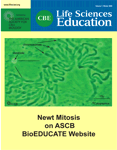Encouraging Minority Undergraduates to Choose Science Careers: Career Paths Survey Results
Abstract
To explore the reasons for the dearth of minorities in Ph.D.-level biomedical research and identify opportunities to increase minority participation, we surveyed high-achieving alumni of an undergraduate biology enrichment program for underrepresented minorities. Respondents were asked to describe their career paths and to reflect on the influences that guided their career choices. We particularly probed for attitudes and experiences that influenced students to pursue a research career, as well as factors relevant to their choice between medicine (the dominant career choice) and basic science. In agreement with earlier studies, alumni strongly endorsed supplemental instruction as a mechanism for achieving excellence in basic science courses. Undergraduate research was seen as broadening by many and was transformative for half of the alumni who ultimately decided to pursue Ph.D.s in biomedical research. That group had expressed no interest in research careers at college entry and credits their undergraduate research experience with putting them on track toward a research career. A policy implication of these results is that making undergraduate research opportunities widely available to biology students (including “premed” students) in the context of a structured educational enrichment program should increase the number of minority students who choose to pursue biomedical Ph.D.s.



